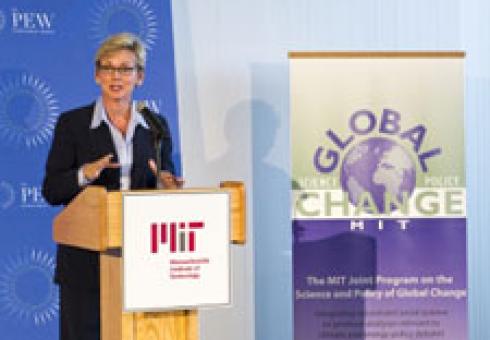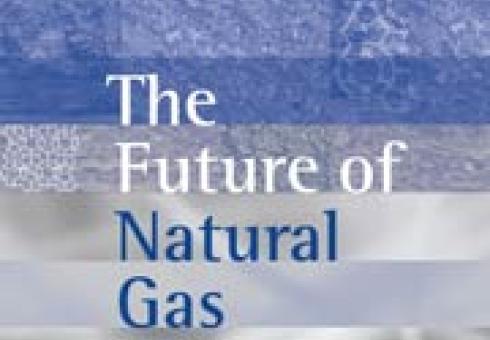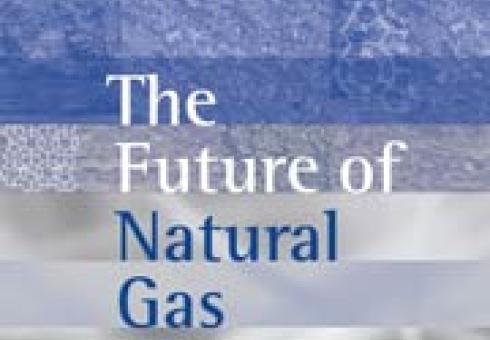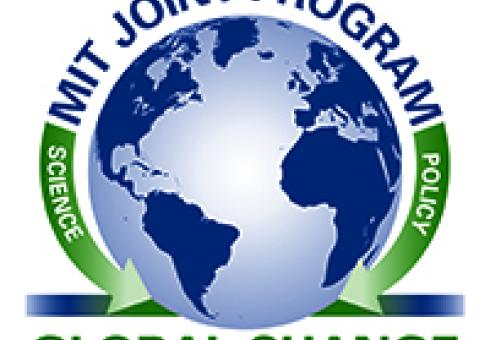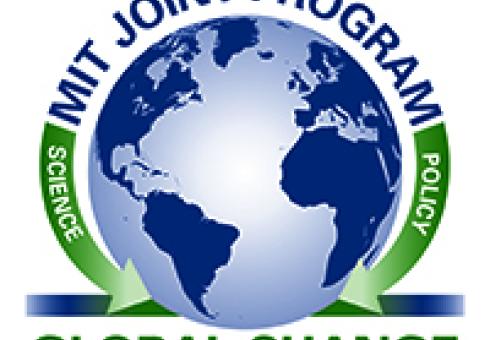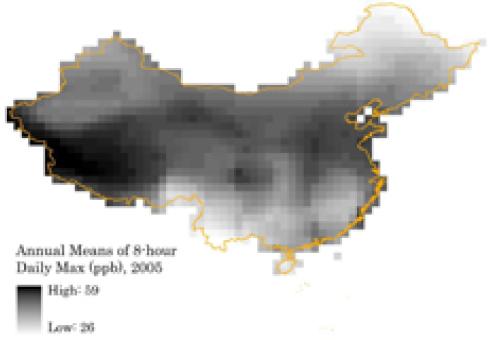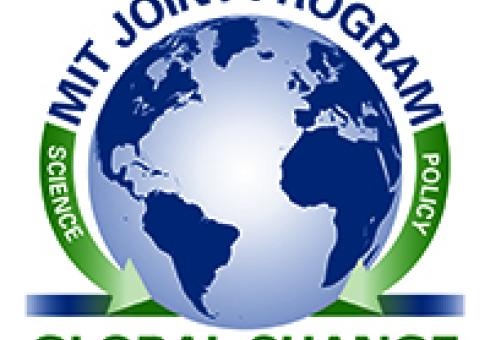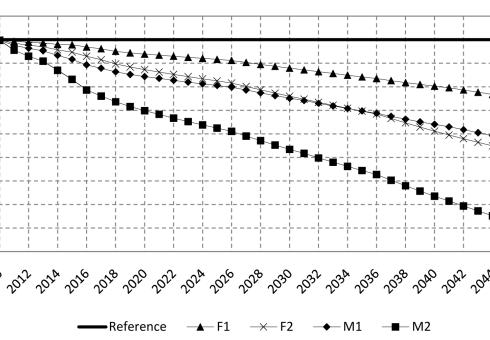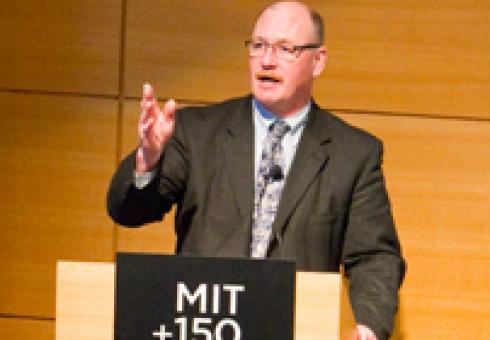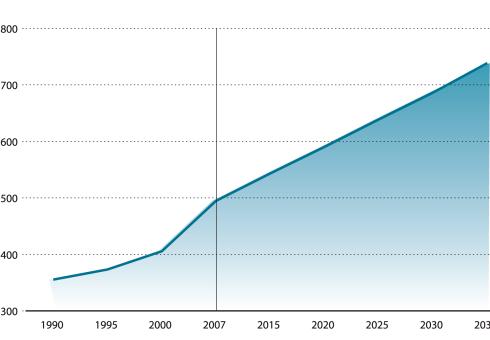News + Media
At MIT, former Michigan governor touts new bipartisan initiatives to make the U.S. the world’s clean-energy champ.
David L. Chandler, MIT News Office

In a spirited talk at MIT, former Michigan governor Jennifer Granholm presented a plan for a bipartisan initiative that she said could help the United States regain a world leadership role in the creation of new clean-energy technologies — and the thousands of new jobs that those technologies could provide.
Introduced by her “old pal,” Massachusetts Gov. Deval Patrick, and MIT President Susan Hockfield, Granholm spoke at Tuesday’s reception on clean-energy innovation. The event was hosted by the MIT Energy Initiative and the Joint Program on the Science and Policy of Global Change, a program that its co-director, TEPCO Professor of Atmospheric Science Ronald Prinn, described as a “unique collaboration between the natural and social sciences.”
“At MIT, we’re bullish on clean energy,” Hockfield said in her introduction. In fact, she said, “bullish is an understatement. We’re maniacs about it!” She added that she sees the clean-energy domain as a major area in which to rebuild the nation’s economy.
Patrick said his attendance was intended “to celebrate the leadership of MIT” in clean-energy technology. He said the Institute “has gone so far beyond the basic science … to commercialize so many great ideas” in clean energy, and that in today’s climate of volatile oil prices, “all the elements align for moving ourselves rapidly to a clean-energy future.” He added that in Massachusetts, there has been a 60 percent increase in energy-related employment “during the worst economy in living memory.”
Granholm, who now represents the Pew Charitable Trusts’ Clean Energy Program, said other countries have been “much more aggressive” than the United States in pushing for clean energy, while this country has “a patchwork” of state policies and no strong national program to promote such technologies. In searching for what Granholm called “pragmatic energy policies that can get bipartisan support” even in the current highly polarized political debate, her organization has identified four specific policy priorities, she said.
First, “a national renewable energy standard” would call for at least 20 percent of the nation’s energy to come from renewable sources by 2020, she said. Such a policy “sends a market signal” that would help businesses focus on developing needed technologies.
A second priority, she said, is encouraging more energy efficiency in industrial facilities. She pointed to the example of a French company called Veolia Energy, which develops combined heat and power systems that can be up to 90 percent efficient in using natural gas, the cleanest of all fossil fuels, compared to typical fossil-fuel powerplant efficiencies of around 50 percent. Granholm pointed out that so much energy is wasted in U.S. powerplants in the form of heat that “if you could just capture that waste heat, you could power the entire nation of Japan.”
Third, she said, is to push for more electrification of the transportation system — including a 25 percent market share for new electric cars by 2020 — and improved efficiency for non-electric vehicles. That would help spur the growth of companies such as the MIT-spinoff A123 Systems, which is already “hiring hundreds of people” for its new battery factories.
And fourth, she said, is to “increase the amount of money we, as a nation, invest in energy development.” ARPA-E, the U.S. Department of Energy’s agency for investment in innovative energy technology, currently has a budget of $3.8 billion per year. “If we boost that to $16 billion, we could really be on the map” as a major producer of energy systems, she said.
Granholm pointed out that since 2004, there has been a 630 percent increase in private-sector investment in clean energy worldwide. In 2008, the United States was number one in production of clean-energy technology, but by 2009 China had surged ahead, and in 2010 both China and Germany were ahead of the United States. “Every day, businesses make decisions about where to locate,” and without a strong clean-energy policy, the country’s competitive position “will continue to ratchet down,” she said.
While some people worry that implementing any national policy on clean energy may be difficult right now given the polarized atmosphere in Washington, Granholm said, a recent national survey gives reason for hope. “Eighty-four percent of Americans want to see a national energy policy that encourages renewable energy and efficiency,” a number that includes 74 percent of Republicans, and even a majority of Tea Party members, she said.
Patrick said fostering clean-energy technologies “is good for us, it’s good for the environment, it’s good for the economy, it’s good for jobs. So let’s get on with it!”
Moderator: Ronald G. Prinn
MIT President Susan Hockfield
Governor Deval Patrick
Governor Jennifer Granholm
The cleanest of fossil fuels, it is far more abundant than previously thought and can have significant impact at little cost, MIT study finds.David L. Chandler, MIT News Office 
Natural gas is important in many sectors of the economy: for generating electricity, as a heat source for industry and buildings, and in chemical feedstock. Given the abundance of natural gas available through extensive global resources and the recent emergence of substantial unconventional supplies in the United States, worldwide usage of the fuel is likely to continue to grow considerably and contribute to significant reductions of greenhouse gas emissions for decades to come, according to a comprehensive, multidisciplinary study carried out over the last three years by MIT researchers.
The study — managed by the MIT Energy Initiative (MITEI) and carried out by a team of Institute faculty, staff and graduate students — examined the scale of U.S. natural gas resources and the potential of this fuel to reduce greenhouse gas emissions. Based on the work of the multidisciplinary team, with advice from a board of 18 leaders from industry, government and environmental groups, the report examines the future of natural gas through 2050 from the perspectives of technology, economics, politics, national security and the environment.
An interim report with some of the study’s major findings and recommendations was released in June 2010. The full report, including additional data and extensive new analysis, was released by MITEI this week.
Because it has the lowest carbon content of all fossil fuels, natural gas can play a critical role as a bridge to a low-carbon future. The study’s economic analysis of the effects of a national policy calling for a 50 percent reduction in greenhouse gas emissions shows that such a policy would result in widespread substitution of natural gas for coal in electricity generation. However, in order to achieve even greater reductions in carbon emissions — which may be mandated in coming decades — natural gas will in turn need to make way for other low- or zero-carbon sources of energy. It is in this sense that natural gas may be seen as a “bridge” rather than as the ultimate long-term solution itself.
The report says that it is important to continue a robust program of research and development on other energy alternatives, which can be used to take the place of natural gas later in the century if and when emissions regulations become stricter. Henry Jacoby, MIT professor of management and co-chair of the study, said that such research is crucial because “people speak of [natural] gas as a bridge to the future, but there had better be something at the other end of the bridge.”
The study found that, contrary to best estimates of a decade or so ago, natural gas supplies are abundant and should be ample even for greatly expanded use of the fuel in coming decades. This is largely the result of the development of “unconventional” sources, such as shale gas. Because of its abundance, widespread distribution and advantages in cost and emissions, use of natural gas is expected to increase substantially under virtually all scenarios involving national policies, regulations and incentives, the study notes.
“Shale gas is transformative for the economy of the United States, and potentially on a global scale” because it has so dramatically increased the amount of gas that can be economically produced domestically, Anthony Meggs, a visiting engineer at the MIT Energy Initiative and co-chair of the study, said at Thursday’s press conference introducing the report.
Concerns have been raised about the possible environmental effects of developing shale gas using a controversial process called “fracking” (for hydro-fracturing), which involves injecting fluids into deep horizontal wells under pressure. The ultimate disposal of those fluids after they are pumped back out, and the possibility that they could contaminate water supplies, have been the subject of lawsuits and legislative attempts to limit the practice. The study found that “the environmental impacts of shale development are challenging but manageable,” and that some cases of the gas entering freshwater tables were “most likely the result of substandard well-completion practices by a few operators.”
Meggs said that in the small number of cases where there has been contamination, the problem has stemmed from improper cementing of the well casings. “The quality of that cementing is the area where the industry, frankly, has to do a better job,” he noted. But even so, he said, the study found only 42 documented incidents of such problems, out of tens of thousands of wells drilled. “It is not trivial,” he said, “but neither is it all-encompassing.” And, he added, even where there are problems, it is possible to go back and fix the well casings later.
The study recommends that to address these concerns, “it is essential that both large and small companies follow industry best practices; that water supply and disposal are coordinated on a regional basis and that improved methods are developed for recycling of returned fracture liquids.” Government funding for research on such systems should be “greatly increased in scope and scale,” the report says.
The robust supply situation enhances the opportunities for natural gas to substitute for other fuels. Using very efficient natural gas powerplants to replace coal-fired plants is “the most cost-effective way of reducing CO2 emissions in the power sector” over the next 25 to 30 years, the report says. Natural gas will also play a central role in integrating more intermittent renewable sources — wind and solar — into the electricity system because they can easily be brought in and out of service as needed.
The study also finds important opportunities for cost and emissions reduction in industry by switching to very high-efficiency natural gas boilers, and for more efficient energy use in commercial and residential buildings through new standards that would provide consumers information on end-to-end energy use of space- and water-heating alternatives. Furthermore, the current large price difference between oil and natural gas, if sustained, could lead to increased use of gas as a transportation fuel, either directly or through conversion to liquid fuel.
The study group suggests that U.S. national security interests will be served by policies that encourage integration of the presently fragmented global natural gas markets, and calls for better integration of such issues into foreign policy.
The report includes a set of specific proposals for legislative and regulatory policies, as well as recommendations for actions that the energy industry can pursue on its own, to maximize the fuel’s impact on mitigating greenhouse gas.
In addressing public concerns about the environmental impact of natural gas drilling operations, the industry could be taking a much more active role, said Ernest Moniz, director of MITEI and chairman of the study. The study makes many specific recommendations for improving well-development procedures, including full disclosure of chemicals used in the hydro-fracturing process and regional coordination on water-use issues. “An endorsement [of these policy recommendations] by industry would be very welcome,” Moniz said. “If industry actively promotes them, that can certainly help overcome” these public and legislative concerns.
Ironically, the study found that “public and public-private funding for natural gas research is down substantially,” even as the fuel is being recognized as a major contributor to strategies for lowering greenhouse gas emissions, said Melanie Kenderdine, executive director of the MIT Energy Initiative. The study recommends a substantial increase in such research.
By ANDREW C. REVKIN
The Massachusetts Institute of Technology has released “The Future of Natural Gas,” the latest in its valuable series of reports examining global energy choices. The report lays out a path for exploiting this abundant and relatively clean source of energy in ways that could limit environmental concerns and give the biggest near-term boost to efforts to trim emissions of carbon dioxide.
One of the most important take-home points, to me, was the authors’ endorsement of a rising role for natural gas as a feedstock for producing liquid transportation fuels. This resonated with discussions I had earlier this month with some senior people at Shell. They spoke at length about Shell’s existing push to produce liquid fuels from gas, most notably at the huge new gas-to-liquids plant in Qatar:
Here are a few highlights from the new report, starting with the M.I.T. team’s conclusion on hydraulic fracturing, or “fracking“:
The environmental impacts of shale development are challenging but manageable. Research and regulation, both state and federal, are needed to minimize the environmental consequences.
On gas as a substitute for coal:
…In the U.S. electricity supply sector, the cost benchmark for reducing carbon dioxide emissions lies with substitution of natural gas for coal, especially older, less efficient units. Substitution through increased utilization of existing combined cycle natural gas power plants provides a relatively low-cost, short-term opportunity to reduce U.S. power sector carbon dioxide emissions by up to 20 percent, while also reducing emissions of criteria pollutants and mercury.
On gas to provide a flexible source of “fill in” power to complement expanded use of variable wind power:
Furthermore, additional gas-fired capacity will be needed as backup if variable and intermittent renewables, especially wind, are introduced on a large scale. Policy and regulatory steps are needed to facilitate adequate capacity investment for system reliability and efficiency. These increasingly important roles for natural gas in the electricity sector call for a detailed analysis of the interdependencies of the natural gas and power generation infrastructures.
Finally, on gas’s potential as a transportation fuel and a substitute for liquid fuels:
Over the last decade or so, when oil prices have been high, the ratio of the oil price to the natural gas price has been consistently higher than any of the standard rules of thumb. If this trend is robust, use of natural gas in transportation, either through direct use or following conversion to a liquid fuel, could in time increase appreciably.
The evolution of global gas markets is unclear. A global “liquid” natural gas market is beneficial to U.S. and global economic interests and, at the same time, advances security interests through diversity of supply and resilience to disruption. The U.S. should pursue policies that encourage the development of such a market, integrate energy issues fully into the conduct of U.S. foreign policy and promote sharing of know-how for strategic global expansion of unconventional gas production.
With rising energy prices, could coal-to-liquid conversion become an economical fuel option?
Converting coal into liquid fuels is known to be more costly than current energy technologies, both in terms of production costs and the amount of greenhouse gases the process emits. Production of coal-to-liquid fuel, or CTL, has a large carbon footprint, releasing more than twice the lifecycle greenhouse gases of conventional petroleum fuels. However, with the rise in energy prices that began in 2008 and concerns over energy security, there is renewed interest in the conversion technology.
Researchers from the MIT Joint Program on the Science and Policy of Global Change (JPSPGC) recently released an assessment of the economic viability of CTL conversion. The researchers looked at how different climate policies and the availability of other fuel alternatives, such as biofuels, would influence the prospects of CTL in the future.
Coal-to-liquid technology has been in existence since the 1920s and was used extensively in Germany in 1944, producing around 90 percent of the national fuel needs at that time. Since then, the technology has been largely abandoned for the relatively cheaper crude oil of the Middle East. A notable exception is South Africa, where CTL conversion still provides about 30 percent of national transportation fuel.
But will there be a resurgence of CTL technology? To determine the role that CTL conversion would play in the future global fuel mix, researchers examined several crucial factors affecting CTL prospects. Different scenarios were modeled, varying the stringency of future carbon policies, the availability of biofuels and the ability to trade carbon allowances on an international market. Researchers also examined whether CTL-conversion plants would use carbon capture and storage technology, which would lower greenhouse gas emissions but create an added cost.
The study found that, without climate policy, CTL might become economical as early as 2015 in coal-abundant countries like the United States and China. In other regions, CTL could become economical by 2020 or 2025. Carbon capture and storage technologies would not be used, as they would raise costs. In this scenario, CTL has the potential to account for about a third of the global liquid-fuel supply by 2050.
However, the viability of CTL would be highly limited in regions that adopt climate policies, especially if low-carbon biofuels are available. Under scenarios that include stringent future climate policies, the high costs associated with a large carbon footprint would diminish CTL prospects, even with carbon capture and storage technologies. CTL conversion may only be viable in countries with less stringent climate policies or where low-carbon fuel alternatives are not available.
“In short, various climate proposals have very different impacts on the allowances of regional CO2 emissions, which in turn have quite distinct implications on the prospects for CTL conversion,” says John Reilly, co-director of the JPSPGC and one of the study’s authors. “If climate policies are enforced, world demand for petroleum products would decrease, the price of crude oil would fall, and coal-to-liquid fuels would be much less competitive.”
Researchers find that a federal climate policy would lower total U.S. emissions, but without large reductions in the aviation sector.Aviation is one of the fastest-growing industries worldwide, and with this growth comes a rise in greenhouse gas emissions. An economy-wide cap-and-trade policy would decrease carbon emissions for all U.S. industries, including the aviation sector. However, researchers from MIT recently found that such a policy would cause only a moderate decrease in aviation-related emissions by 2050. They released their results in a report, The Impact of Climate Policy on U.S. Aviation.”
Researchers from MIT’s Joint Program on the Science and Policy of Global Change and the Partnership for AiR Transportation Noise and Emissions Reductions, or PARTNER, combined two computer models to develop a unique analysis of the impacts of U.S. climate policy. First, the Emissions Prediction and Policy Analysis (EPPA) model analyzed the global economy and the greenhouse gases linked to economic activity, including the impact of a cap-and-trade policy on fuel prices, emission allowances and the overall economy. Next, the Aviation Environmental Portfolio Management Tool for Economics (APMT-E) modeled the aviation industry’s response to climate policy, estimating changes in aviation-related emissions and operations.
The researchers used these two models to examine the impact of the American Clean Energy and Security Act of 2009 (H.R. 2454), more commonly known as the Waxman-Markey bill. This bill, recently passed by the House of Representatives, proposed a 17 percent reduction in greenhouse gas emissions from 2005 levels by 2020 and an 80 percent reduction by 2050. Although the Waxman-Markey bill was rejected by the Senate, policies that set reduction targets for greenhouse gas emissions are likely to be implemented in the future. The reduction targets in this bill cover the entire U.S. economy, including the aviation sector.
But researchers found that aviation-related emissions would actually increase by 97-122 percent between 2012 and 2050 under the Waxman-Markey climate policy — a relatively small change from the 130 percent increase expected without climate policy. This result indicates that, while the overall policy effectively reduces total U.S. emissions, more emissions are abated in non-aviation sectors. That is, aviation contributes to reducing national emissions mainly by funding, via the purchase of permits, relatively inexpensive abatement options in other sectors, such as electricity generation.
In fact, there are three main reasons the Waxman-Markey bill has only a small impact on aviation emissions. The first is that some sectors, such as the energy industry, are able to reduce emissions easily (i.e., inexpensively), while other sectors, such as the aviation industry, have more costly emissions-abatement options. Currently, there are limited opportunities for airlines to replace carbon-intensive energy sources. Because airlines already operate closer to the fuel efficiency frontier than many other industries, there are cheaper mitigation options, or “lower-hanging fruit,” in these other sectors.
Second, although rising fuel prices — and thus rising airfares — can impact demand, there is still strong growth in demand for aviation in the policy scenarios. Third, the researchers found that the U.S. aircraft fleet becomes less fuel-efficient under the modeled climate policy. Fleet-efficiency changes are driven by two opposing forces: On one side, by demand reductions (relative to a future without climate policy), which cause airlines to delay purchases of new, more fuel-efficient aircraft; while on the other side, higher fuel prices oppose this incentive, inducing airlines to purchase more fuel-efficient aircraft. In the MIT simulations, the first force (reduced demand) dominates the second force (fuel price incentives), causing fleet efficiency to decrease.
Overall, the study shows that aviation emissions-abatement options are costly relative to mitigation options in other sectors. But the results of this research come with several caveats. Because the study focuses on long-term trends, shorter adjustments associated with business cycles are not considered. For example, in economic downturns, airlines may park old aircraft, which are then replaced by new, efficient aircraft in future high-growth periods. In addition, the model did not consider adjustments airlines could make to their existing fleets, such as retrofitting seat configuration, using slower flight speeds, or reducing cabin weight. Changes in air-traffic management may also improve operations and reduce emissions. Future work, which will include such considerations, may show that climate policy has a larger, positive effect on fleet fuel efficiency.
The authors also caution that the small reduction in aviation emissions does not indicate that the policy would be ineffective at reducing national emissions. Faced with high abatement costs, it is cheaper for the aviation sector to fund abatement in other sectors than reduce their emissions; a cap-and-trade system allows this to occur. Additionally, the study does not consider benefits from the climate damages that may be avoided through such policies, so the results cannot be used to assess the overall effectiveness of climate policy.
Hear Noelle Selin discuss air pollution in China on Danish Radio. (Interview in Danish)
How costly are the health damages from air pollution in China?
China has experienced unprecedented development over the past three decades, but this growth has come at a substantial cost to the country’s environment and public health. China is notorious for extremely high levels of air pollution. As the country faces continuous environmental challenges that mirror its continuing development, there is a need to measure the health impacts of air pollution.
A recent study released by the MIT Joint Program on the Science and Policy of Global Change quantifies the damage to the Chinese economy caused by a lack of air-quality control measures between 1975 and 2005. Not surprisingly, the MIT researchers found that air pollutants produced a substantial socio-economic cost to China over the past three decades.
What makes this study unique is that researchers looked at long-term economic impacts that arise from health damages, and how pollution-induced morbidity and mortality cases may have had ripple effects on the Chinese economy beyond the time period when those cases actually occurred. This method creates a comprehensive picture of the cumulative impacts of air pollution on a dynamic, fast-developing country.
“This study represents a more accurate picture than previous studies of the air-pollution damages associated with rapid economic development in China,” says Noelle Selin, an assistant professor of engineering systems in MIT’s Engineering Systems Division, with a joint appointment in atmospheric chemistry in the Department of Earth, Atmospheric and Planetary Sciences. “A major advantage of this study over previous work is that it links state-of-the-art atmospheric modeling tools with a comprehensive global economic model incorporating health and economic damages from pollution.”
To observe how changes in pollutants, and their associated health impacts, have historically affected the Chinese economy, the MIT researchers modeled the number of cases of health incidences caused by air pollution — such as restricted-activity days, respiratory hospital admissions and asthma attacks, to name a few examples — given a pollution level and the number of people exposed. Then the model calculated the summed costs of these incidences — i.e., payments for health services and medicine, loss of labor and productivity from time off work, loss of leisure time needed for healing — to estimate the total change in available labor supply.
The study focused on two major air pollutants: particulate matter and ozone. Levels of particulate matter, which causes respiratory and cardiovascular diseases and accounts for a large fraction of damage to human health, are extremely high in China. In the 1980s, particulate matter concentrations were at least 10-16 times higher than the World Health Organization’s annual guidelines. Even in 2005, after significant improvements in Chinese air quality, concentrations were still about five times higher than the guidelines.
China has only recently begun monitoring levels of the second air pollutant, ozone. Chinese ozone data does not exist between 1970 and 2005, the period considered in this study. In fact, most air pollution studies of China omit the pollutant completely due to lack of data. However, the MIT study incorporates historical ozone levels over the past three decades as simulated by GEOS-Chem (a chemical transport model) and MIT’s Integrated Global Systems Model, thus significantly improving on previous studies of pollution damage.
The researchers found that, although the magnitude of air pollution in China decreased over the three decades, damages associated with the pollutants created a substantial burden on the Chinese economy. “The results clearly indicate that ozone and particulate matter have substantially impacted the Chinese economy over the past 30 years,” Selin says.
When comparing historical pollution levels and the associated impacts with a counterfactual scenario in which pollutants were restricted to background levels, or the best attainable air quality standards, China experienced an increasing loss in welfare — from $22 billion lost in 1975 to $122 billion lost in 2005 — from pollution-related health impacts.
There are two main reasons for the increasing loss in welfare, despite reduced levels of pollution between 1975 and 2005. First, rapid urbanization and growth increased the number of people exposed. Second, productivity of labor increases over time so that costs from lost labor are higher in recent times than in periods in the past. These factors outweigh the small improvements in air quality.
If a modest, feasible level of air-pollution control measures had been implemented over the time period, China would have reaped an increasing benefit in welfare — potentially growing from $18 billion gained in 1975 to $80 billion in 2005.
Similar studies conducted by the World Bank have found that air pollution in China caused damages equal to 4-5 percent of the Chinese GDP between 1995 and 2005. However, these estimates are based on static measurements that do not measure the cumulative, long-term impacts of health damages. The MIT study found a significantly higher level of damage, equaling 6-9 percent of the Chinese GDP. The dynamic, cumulative method used in the MIT study may be particularly applicable to developing countries that are experiencing rapid growth.
The MIT study looked at the benefits of air-quality controls on health damages in China, but did not calculate the costs of implementing such policies. Future work will focus on the costs of pollution controls so that a complete cost-benefit analysis can be developed.
Related documents: Health Damages from Air Pollution in China
Press Release:
Top economist will work with experts around the world to address global food issues
May 24, 2011 (MILAN) – John M. Reilly, Co-Director of the MIT Joint Program on the Science and Policy of Global Change, is now the newest member of the Barilla Center for Food and Nutrition (BCFN) Advisory Board, a panel of top health, food, environment, economy and medical experts around the world. Dr. Reilly will collaborate with other BCFN experts and Board members to analyze and develop proposals on pressing global food and nutrition issues.
The BCFN is a think tank established to gather global knowledge on food, analyze it and propose solutions to negotiate the challenges of the future. It aims to encourage general well-being through a healthy and sustainable approach to food. Over the last three years, the BCFN has published 11 works on the subjects of environmental sustainability, relationship between food and health in adults and children, access to food resources and cultural value of food.
“An integrated look at the food system considering the nutrition and health of consumers, the environmental sustainability of the production system, and its potential vulnerability to climate and environmental change is much needed as we look ahead to a growing world population and increased threats of environmental change,” Dr. Reilly said. “I look forward to working with the BCFN on these topics and expect to learn as much as I contribute given the outstanding group of experts the center has assembled to support their work.”
Dr. Reilly, an energy, environmental and agricultural economist, focuses on understanding the role of human activities as a contributor to global environmental change and the effects of environmental change on society and the economy. A key element of his work is the integration of economic models of the global economy as it represents human activity with models of biophysical systems, including the ocean, atmosphere and terrestrial vegetation.
“Our board members are the best in their fields, and we are excited to have Dr. Reilly join us,” said Guido Barilla, BCFN Chairman. “His experience and research on energy systems and the intersection of the economy and the environment will be key to our future research on the sustainability issues of the food and nutrition industry.”
The BCFN Advisory Board ensures that the most advanced knowledge and foremost professional capacities are used to address the BCFN’s specific themes and to enhance and refine the quality of its work. The members identify topics of interest, develop distinctive and scientifically valid content and make proposals and recommendations. Dr. Reilly will join the current members:
- Barbara Buchner, Director of the Climate Policy Initiative of Venice
- Mario Monti, President of the Università Bocconi of Milan
- Gabriele Riccardi, Professor of Endocrinology and Metabolic Pathologies at the Università degli Studi of Naples
- Camillo Ricordi, Professor of Surgery, Medicine, Biomedical Engineering, Microbiology and Immunology at the University of Miami
- Claude Fischler, Directeur de Recherche at CNRS
- Umberto Veronesi, Scientific Director of the European Institute of Oncology of Milan
About the Barilla Center for Food and Nutrition
The Barilla Center for Food & Nutrition is a multidisciplinary think tank focusing on issues of food and nutrition and their relations to economics, medicine, diet, sociology and the environment.
The work of the Barilla Center for Food & Nutrition is backed by an authoritative Advisory Board composed of Barbara Buchner, Director of the Climate Policy Initiative of Venice; Jean-Paul Fitoussi and Mario Monti, economists; Gabriele Riccardi, endocrinologist; Camillo Ricordi, surgeon and scientist; Claude Fischler and Joseph Sassoon, sociologists; and Umberto Veronesi, oncologist.
by James Ott
Aviation Week, May 20, 2011
A report from the Massachusetts Institute of Technology (MIT) should be required reading for environmental policymakers. “The Impact of Climate Policy on US Aviation” was issued this week by the Transportation Research Board. It is an independent assessment and takes no prisoners in the sometimes strange world of environmental protection.
The policy in question is the proposed American Clean Energy and Security Act of 2009 [H.R. 2454], also known as the Waxman-Markey bill. It looked like a sure winner for a while and prompted the study. But the plan to curtail greenhouse gas emissions failed in the Senate. Yet cap-and-trade programs are likely to come up again, says Niven Winchester, an MIT research scientist, so the conclusions of the report are connected to a likely future.
Based on traffic growth forecasts from the International Civil Aviation Organization (ICAO), emissions from aviation, if the law was passed, are estimated to increase between 97-122% between 2012 and 2050. This compares with 130% growth without a policy. The proposal would have affected all U.S. industries as the targets were refineries that would have been required to purchase allowances for each potential ton of carbon dioxide emissions. Aviation would have been heavily affected by this cap-and-trade deal because fuel represents 26% of total costs, and it is hard to make a shift to other sources. Other industries can shift relatively easily from coal to electricity, for example.
The study concludes that abatement options for aviation are costly relative to mitigation options in other sectors. In addition to increasing fuel price, the study indicates that the law would reduce fleet efficiency, “as increased air fares reduce demand and slow the introduction of new aircraft.”
An unsettled and contentious issue is how one nation’s climate policy will affect foreign carriers flying to and from that nation, the report said. The Air Transport Association of America (ATA) filed a suit, challenging the legality of requiring U.S. airline flights to and from the European Union to purchase allowances under the law there. It’s always interesting when one nation’s plans interfere with those of another.
The study was carried out by MIT’s Partnership for AIR Transportation Noise and Emissions Reduction, a center of excellence backed by the FAA, NASA and Transport Canada. A key conclusion compares favorably with the ATA’s concerns over the bill’s impact on profitability. ATA estimated that the fuel bill would increase airline costs by $5 billion in 2012 and $10 billion in 2020. The report cited 10 previous papers on the subject of environmental policy, largely using the EU experience. The latest is one of two related to U.S. environmental policy. The partnership’s web site is http://www.partner.aero
Joint Program Report 198: The Impact of Climate Policy on US Aviation
Aviation CO2 emissions in the reference and policy scenarios, 2066-2050
by John Reilly with Henry Jacoby, Ronald Prinn, and Richard Schmalensee
Huffington Post, May 20, 2011 Recent research has shown that over the next few decades an effective U.S. climate policy to significantly reduce greenhouse gas emissions would rely on extensive reductions in energy use and substitution of natural gas for coal in power generation. The second pathway -- gas-for-coal -- is premised on the fact that natural gas, when combusted, produces 50 percent lower CO2 emissions than coal.
Recent research has shown that over the next few decades an effective U.S. climate policy to significantly reduce greenhouse gas emissions would rely on extensive reductions in energy use and substitution of natural gas for coal in power generation. The second pathway -- gas-for-coal -- is premised on the fact that natural gas, when combusted, produces 50 percent lower CO2 emissions than coal.
A recent paper by Cornell Professor Robert Howarth and others in Climatic Change Letters calls the gas-for-coal solution into serious question, suggesting that natural gas power generation is twice as greenhouse gas (GHG) intensive as coal. Howarth bases this conclusion in part on his assessment of methane leakage in the production stages of natural gas, with a specific focus on new methods to produce unconventional shale gas.
Natural gas is primarily methane. There are methane leakages at different stages of the production process, as well as CO2 emissions when natural gas is burned to generate electricity. Methane is a powerful GHG but, unlike CO2, which resides in the atmosphere for over a century, methane lives in the atmosphere for around a decade.
The Howarth study raises some legitimate questions about the uncertainties surrounding associated estimates of methane emissions -- but Howarth's conclusions depend on a couple of unsound assumptions.
First is the metric Howarth used to compare the warming impact of methane to that of CO2. This can be a complex calculation, because there are several different kinds of GHGs with different life spans and varying impacts on the climate.
To make a comparison among these different GHGs, whose lifetimes can range from a few to thousands of years, the "global warming potential" (GWP) concept was developed in the 1990s. In general, policymakers have focused on GWPs calculated over a 100-year period, although the Intergovernmental Panel on Climate Change (IPCC) also calculated GWPs over 20- and 500-year periods.
The choice between 20-, 100-, or 500-year GWPs comes down to whether one wants to measure the near-term impacts of global warming or the longer-term impacts. Choosing an index based on 20 years, as Howarth has done, largely ignores serious longer term risks of climate change, masking the urgent need to immediately start controlling those GHGs that will remain in the atmosphere for hundreds to thousands of years.
Howarth's choice threatens to tilt critical policies away from some of the more dangerous risks we face in the longer term, focusing us instead on near-term and largely manageable gas production methane leakage. For these reasons, his choice of the 20 year GWP is outside the norm -- indeed, EPA, DOE, the California Air Resources Board, and others routinely use the 100 year GWP in their policy analysis.
Howarth also assumes a gas power generation efficiency as low as 28 percent. That figure can be misleading, because it applies not to the "base-load" generation units that would compete with coal to meet the consistent daily electricity demand of consumers, but to "peaking units" which help meet variable demand in electricity. Peaking units have relatively low efficiencies, in the range suggested by Howarth.
Natural gas base-load units have efficiencies in the 40-54 percent range, compared to 30-35 percent for the current fleet of coal plants. The higher the efficiency, the less CO2 is emitted for every kilowatt hour of electricity produced.
Recalculating the gas-coal comparison using Howarth's methane emissions figures -- but sticking with the 100-year GWP and more accurate gas unit efficiencies -- shows roughly 50 percent lower greenhouse gas emissions from natural gas generation compared to coal generation.
Finally, it is important to recognize that methane leakage from natural gas production is wasted product with economic value: gas producers have a financial incentive to capture this methane. And ideally, climate policy through a GHG price would penalize methane leakage, providing producers with additional incentives for capturing methane.
Reduced energy use and coal-to-gas substitution could provide a bridge to a low carbon future, enabling us to move forward on climate change mitigation while we continue critical research on other more advanced technologies. Energy alternatives require close scrutiny for their range of impacts on the environment -- the environmental effects of shale gas are no exception.
It would, however, require much more compelling evidence and analysis to persuade us that we should actually use more coal and less natural gas power generation, a logical conclusion from Howarth's paper. Calculations that test conventional wisdom are important in driving further scrutiny. The preponderance of the evidence, however, continues to support the conclusion that substitution of gas for coal in power generation is an important component of a sensible and effective near-term climate change policy.
New York Times, May 18, 2011
By DAVID LEONHARDT
Michael Greenstone and Adam Looney, economists at The Hamilton Project, are releasing a new paper Wednesday on the costs of American energy policy. They argue:
For example, Mr. Greenstone and Mr. Looney estimate that a coal plant must spend 3.2 cents to produce a kilowatt hour of electricity (and consumers then pay slightly more than this). This price appears to be a bargain, the economists write, but the true costs — once health costs, military costs and the like are taken into account — are more than twice high: 8.8 cents per kilowatt hour.
The paper calls for four steps that will be familiar to anyone who follows climate policy: a carbon tax or cap-and-trade system; more money for research and development; more efficient regulations; and negotiations with foreign countries over similar steps elsewhere. In the foreseeable future, all these steps all seem to be an enormous long shot. But the climate problem is not going away.
In addition to being the director of the Hamilton Project, Mr. Greenstone is an M.I.T. professor and one of the country’s leading environment economists. More from the paper follows:
Our primary sources of energy impose significant health costs on our citizens — particularly among infants and the elderly, our most vulnerable. For instance, even though many air pollutants are regulated under the Clean Air Act, fine particle pollution, or “soot,” is estimated to still contribute to roughly one out of every twenty premature deaths in the United States (EPA 2010b). Indeed, soot from coal power plants alone is estimated to cause thousands of premature deaths and hundreds of thousands of cases of illness each year….
The social costs associated with using carbon-intensive fuels also include climate change. If carbon dioxide (CO2) emissions continue to rise at the current rate, they are likely to drive temperature changes that have significant environmental and health consequences: rising sea levels, storms that are more frequent and more severe, increased flooding and drought, and other dramatic changes in weather patterns. These changes in turn could result in an increase in water- and insect-borne diseases as well as in the loss of biodiversity and, due to floods or droughts, the loss of human lives and livelihoods….
Finally, there are other economic, political, and national security risks associated with current domestic energy policies. Oil still plays an important role in the American economy: it powers most of our transportation sector and is an important input in many industries. Continuing turmoil in the Middle East has raised the profile of energy security and the geopolitical implications of reliance on oil. In part to protect major oil supplies, the United States has maintained a military presence in the Middle East for more than 50 years. On several occasions, it has become mired in military interventions in part to prevent oil supply disruptions, among other objectives.
Full text pdf available here: A Strategy for America’s Energy Future

Projections of World Energy Consumption (EIA 2010)

